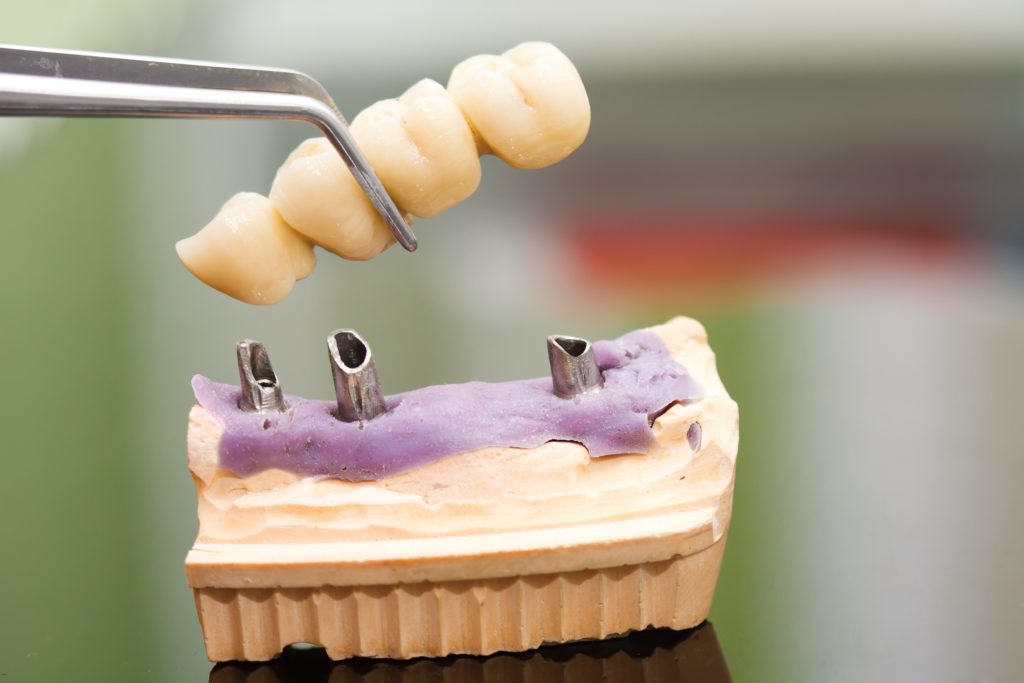Teeth replacements have come a long way in the last few decades and the types of dental implants available are growing. The latest and greatest development in the world of dentistry, is arguably, the dental implant. In years past, dentists would prefer to use a treatment wherein a fabricated tooth was affixed to adjacent teeth, thereby creating a dental bridge.
Today, dental implants are a very popular choice among dentists because it allows for a permanent tooth and root to be fused to the jawbone.
While both of these options can be very effective, it is important to be aware of the requirements of each as well as their differences so you can easily select the one that makes the most sense for you.
What is a Dental Implant?
A dental implant is actually a root replacement. A titanium anchor is inserted into the bone of the jaw. A fabricated tooth acts as the crown and is the visible tooth replacing the tooth that was lost. The new tooth functions and appears just like a natural tooth.
What are the Advantages of a Dental Implant?
A dental implant is very different than a bridge. Instead of bridging the gap with crowns and prosthetics, an implant is an artificial tooth root that is attached to your jaw bone. A connector, also known as an abutment, is then attached to the artificial root and a custom-made crown is attached to the connector.
Implants are aesthetically pleasing and functional. They are more reliable than a bridge, and will not need replacement in years to come. They are also very resistant to tooth and gum decay. They have greater durability and longevity than a bridge and will last for the rest of your lifetime.
What are the Disadvantages of a Dental Implant?
The downside of a dental implant is that it is a minor surgery and will require the necessary time to heal. Dental implants require more time and care than dental bridges. Since the implant is attached to the jawbone, it does require minor surgery. Aftercare may be more extensive with dental implants to ensure proper healing.
What is a Dental Bridge?
A dental bridge, by contrast, is a prosthesis that is fixed in place and is attached to the natural adjacent teeth. This procedure requires the adjacent teeth to be “prepped” by removing most of the enamel in order to fabricate the bridge to span the gap.
What are the Advantages of a Dental Bridge?
Dental bridges are esthetically pleasing, functional, predictable and reliable. They are less costly, and require less time to prepare for, and recover from the procedure. (While they cost less initially, there might be replacement costs in the future.) This might be your best option if the tooth or teeth have been lost for a long time because the gum and bone will have receded making a successful implant procedure more difficult.
What are the Disadvantages of a Dental Bridge?
Dental bridges require significant removal of the enamel of the adjacent teeth. If those teeth have crowns, they will probably need to be redone. Tooth decay is still a possibility with a bridge, and a root canal might be necessary if the nerves are affected. Bridges have less longevity than an implant.
Other Considerations
- Oral health
Your current oral health may dictate which option is best for you. In order to utilize a dental bridge, the neighboring teeth or implants need to be able to support crowns. A dental implant needs a sufficient amount of jaw bone to be effective. Schedule an appointment with our dentist to have your teeth, gums and bone assessed. - Longevity
Dental bridges can last anywhere from five to fifteen years. Dental implants, on the other hand, may last twenty-five years or more. The longevity of your dental device depends on your care and maintenance once your procedure has been completed. Bridges and implants need to be cleaned and cared for just like your natural teeth. - Cost
Cost can be a deciding factor for many people. Dental bridges vary in cost depending on your location, the materials used for the crowns, how many teeth need to be replaced and more. That said, dental bridges may cost significantly less than implants. A single dental implant may cost up to $7,000. However, the cost will depend on many factors including how involved the surgery is and whether or not bone grafting is needed.
Which Option is Right for You?
Ultimately, this is a decision between you and your dentist. You are more than welcome to contact us to set up an appointment to evaluate your current oral health and achieve the best possible outcome.
Please note that East Valley Dental Professionals does not perform dental implant procedures–we do dental implant reconstruction. This information has been provided for educational purposes only.

